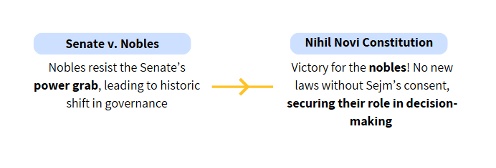May 27, 2025
Understanding “Nothing About Us Without Us”

Understanding “Nothing About Us Without Us”
Authors: Rachel Bath and Michelle Willson
Visuals by: Ramitha Muralitharan
Audio Narrator: Noor Al-Azary
Audio Format
Introduction
Slogans are memorable phrases used to quickly convey important messages. Have you ever heard the slogan “Nothing About Us Without Us”?
“Nothing About Us Without Us” is a powerful slogan of the disability rights movement, emphasizing that people with disabilities must be involved in decisions that affect their lives. But did you know this powerful slogan didn’t originate in the disability rights movement? It has connections that go back to Medieval Europe!
Keep reading to discover how a 1505 constitution from Poland is related to the worldwide movement driving positive change for disability rights.
Where did the Slogan Come From?
The slogan “Nothing About Us Without Us” has roots in sixteenth century Poland. In 1505, the Polish parliament, known as the Sejm, adopted the Nihil novi constitution—Latin for “nothing new.”
This constitution came from a power struggle in the Sejm that changed how Poland was governed. At the time, the Sejm was a two-part parliament (which means the people who made laws were split into two groups, the Senate and the Chamber of Deputies). The Senate included the richest and most powerful people in society. The Chamber of Deputies included the nobles, who were less important people who owned land. Although the king needed the Sejm’s approval for major decisions, the Senate had more influence over the King’s decisions than the nobles.[i]

When the Senate tried to get rid of the nobles’ power, the nobles pushed back. The Sejm passing the Nihil novi constitution was a major win for them. It made sure that no new laws could be made without the Sejm’s consent, so the nobles were able to help make laws.

The idea behind the Nihil novi constitution is that people affected by decisions should be part of making those decisions. This idea is captured in the Polish slogan Nic o nas bez nas, which translates to “Nothing About Us Without Us”!
But how did this medieval slogan become so important to disability rights today?
Adoption of the Slogan by the Disability Rights Movement
In the 1990s, disability rights activists* adopted the slogan. James I. Charlton recalls first hearing it mentioned in South Africa in 1993 by Michael Masutha and William Rowland, leaders of Disabled People South Africa. They had heard about it at an international disability rights conference in Eastern Europe.[ii]
The slogan quickly caught on. At a time when people with disabilities were often seen as incapable, this slogan shared the idea that they know what is best for themselves and should be able to make decisions about their lives.
Since then, the disability rights movement has used the slogan to push for full participation in society. This means having a real voice in decisions about care, work, education, and public life. People with disabilities should be included in community events, public spaces, and policymaking—just like anyone else.
In short, “Nothing About Us Without Us” now means that people with disabilities should be fully included in things that impact them, not pushed to the sidelines or spoken for.
International Impact
The idea of “Nothing About Us Without Us” has had an impact on disability rights around the world. It influenced the United Nations Convention on the Rights of Persons with Disabilities (UNCRPD).[iii]
This convention says that people with disabilities should be able to live without discrimination and have equal opportunities in school, work, and health. It also supports their independence and freedom to make their own choices.
People with disabilities and disability organizations from around the world helped to make the UNCRPD.[iv] They talked, negotiated, and wrote together when making the document. This teamwork made sure the voices of the disability community were heard and respected, following the idea of “Nothing About Us Without Us.”
Nothing About Us Without Us in Canada: Current Efforts and Challenges
The slogan “Nothing About Us Without Us” has also had an impact on disability rights in Canada.
When Canada agreed to the UNCRPD in 2010, it promised to follow its rules. Since then, Canada has acted to support the rights of people with disabilities. For example, the Accessible Canada Act of 2019 aims to make Canada barrier free by 2040.[v] The Act requires places regulated by the federal government like banks, airports, and Canada Post to ask people with disabilities for input when making accessibility plans.
Canadian disability organizations are making sure the government keeps its promises from the UNCRPD. CCRW and other disability organizations worked together to create a report about the concerns of different disability communities in Canada.[vi] They shared this report with the UNCRPD Committee, who in turn made suggestions to Canada about how disability rights could be improved within Canada.[vii]
Even with these efforts, there are still challenges. It's hard to make sure people with disabilities can fully take part in decision-making because of built-in obstacles to inclusion and lack of awareness about what people with disabilities bring to the table. Ongoing advocacy and teamwork between the government, disability organizations, and the community are needed to overcome obstacles to true inclusion.
Conclusion
Slogans are helpful because they make complex ideas easy to remember and can inspire people to act. They unite people by reminding us of our shared goals and the power of working together. This means that “Nothing About Us Without Us” is more than just a catchy phrase—it’s a call for action.
When people with disabilities are included in decisions that affect them, it gives them more control over their own lives. It shows respect for their knowledge and experiences and improves their ability to take part in their communities. By listening to their voices and working together, we can build a more inclusive society.
* Activists are people who are trying to make a positive change in society.
References
- Poland Daily Live. (2020, March 5). Golden age of Poland – XV and XVI century with Krzysztof Jabłonka [Video]. https://www.youtube.com/watch?v=HT771Iwvi8M
- Charlton, J. I. (1998). Nothing About Us Without Us: Disability Oppression and Empowerment. University of California. https://www.jstor.org/stable/10.1525/j.ctt1pnqn9
- United Nations. (2006). Convention on the Rights of Persons with Disabilities. Office of the High Commissioner for Human Rights. https://www.ohchr.org/en/instruments-mechanisms/instruments/convention-rights-persons-disabilities
- Amosu, A. (Host). (2022, July 19). Disability rights: How “nothing about us without us” powered a global treaty (No. 26) [Audio podcast episode]. In Strength & Solidarity. https://strengthandsolidarity.org/podcast/26-disability-rights-how-nothing-about-us-without-us-powered-a-global-treaty/
- Government of Canada. (2019). Accessible Canada Act, S.C. 2019, c. 10. https://laws-lois.justice.gc.ca/eng/acts/A-0.6/
- Canadian Council on Rehabilitation and Work. (2024, April 25). #CRPD #InclusionMatters #UNCRPD [Post]. LinkedIn. https://www.linkedin.com/posts/.../activity-7305581320296927232-gswk
- ARCH Disability Law Centre. (2025, March 27). The United Nations releases concluding observations on Canada’s review of disability rights implementation. https://archdisabilitylaw.ca/.../
Subscribe
Sign up to receive updates from CCRW.